Vegan Collagen Skincare Market Size and Share Forecast Outlook 2025 to 2035
The Global Vegan Collagen Skincare Market is expected to record a valuation of USD 1,311.8 million in 2025 and USD 5,786.8 million in 2035, with an increase of USD 4,475.0 million, which equals a growth of 193% over the decade. The overall expansion represents a CAGR of 16.0% and a nearly 2X increase in market size.
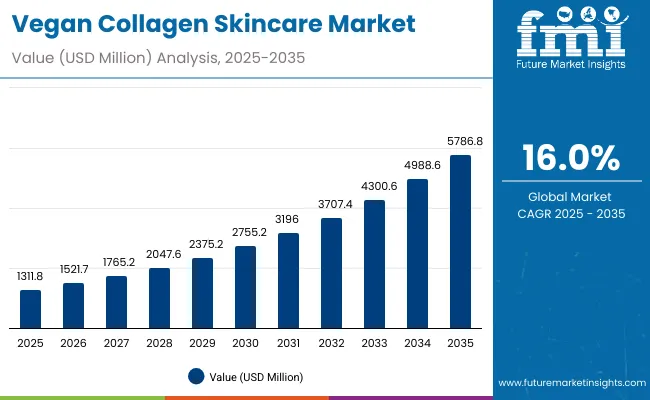
Quick Stats for Global Vegan Collagen Skincare Market
Global Vegan Collagen Skincare Market Value (2025): USD 1,311.8 million
Global Vegan Collagen Skincare Market Forecast Value (2035): USD 5,786.8 million
Global Vegan Collagen Skincare Market Forecast CAGR: 16.0%
Leading Segment in Global Vegan Collagen Skincare Market in 2025: Creams & Lotions (54.2%)
Key Growth Regions in the Global Vegan Collagen Skincare Market: Asia-Pacific, North America, Europe
Top Key Players in Global Vegan Collagen Skincare Market: Geltor, Ecovative, Amyris, Vital Proteins, Shiseido, L’Oréal, Unilever, Pacific BioLabs, Dermalogica, Aloisia Beauty

Global Vegan Collagen Skincare Market Key Takeaways
Metric
Value
Global Vegan Collagen Skincare Market Estimated Value in (2025E)
USD 1,311.8 million
Global Vegan Collagen Skincare Market Forecast Value in (2035F)
USD 5,786.8 million
Forecast CAGR (2025 to 2035)
16.0%
During the first five-year period from 2025 to 2030, the market increases from USD 1,311.8 million to USD 2,755.2 million, adding USD 1,443.4 million, which accounts for 32% of the total decade growth. This phase records steady adoption in anti-aging serums, moisturizers, and nutricosmetic hybrids, driven by the need for clinically backed vegan collagen alternatives. Yeast-derived collagen dominates this period as it caters to over 43% of applications requiring scalable and sustainable formulations.
The second half from 2030 to 2035 contributes USD 3,031.6 million, equal to 68% of total growth, as the market jumps from USD 2,755.2 million to USD 5,786.8 million. This acceleration is powered by widespread deployment of nutricosmetic hybrids, AI-personalized skincare solutions, and algae-derived formulations in smart beauty platforms. Ingestible formats such as capsules and gummies together capture a larger share above 40% by the end of the decade. E-commerce-led retail models and direct-to-consumer platforms add recurring revenue, increasing the online channel share beyond 45% in total value.
From 2020 to 2024, the Global Vegan Collagen Skincare Market grew from USD 630 million to USD 1,200 million, driven by topical-centric adoption. During this period, the competitive landscape was dominated by multinational beauty conglomerates controlling nearly 80% of revenue, with leaders such as L’Oréal, Shiseido, and Unilever focusing on anti-aging skincare formats infused with plant-based actives. Competitive differentiation relied on brand credibility, distribution reach, and clinical efficacy, while vegan collagen was often positioned as a niche ingredient rather than a mainstream offering. Ingestible hybrids had minimal traction, contributing less than 10% of the total market value.
Demand for vegan collagen skincare will expand to USD 1,311.8 million in 2025, and the revenue mix will shift as nutricosmetic hybrids and e-commerce channels grow to over 45% share. Traditional topical leaders face rising competition from biotech-first players offering fermentation-derived collagen, algae innovations, and subscription-based skincare ecosystems.
Major incumbents are pivoting to hybrid models, integrating ingestibles, AI-led personalization, and clean-label claims to retain relevance. Emerging entrants specializing in precision fermentation, cruelty-free platforms, and microbiome-compatible products are gaining share. The competitive advantage is moving away from legacy beauty branding alone to biotech partnerships, sustainable sourcing, and ecosystem-driven loyalty models.
Why the Global Vegan Collagen Skincare Market is growing?
Advances in precision fermentation and algae biotechnology have improved efficacy and purity, allowing for more efficient integration across skincare and ingestible formats. Yeast-derived collagen has gained popularity due to its scalability and established supply chain advantages. The rise of anti-aging serums and creams has contributed to strong penetration across premium beauty markets, while nutricosmetic hybrids are creating new cross-category adoption.
Expansion of e-commerce and direct-to-consumer subscription models has fueled market growth. Innovations in capsule/gummy formats and skincare AI-personalization platforms are expected to open new application areas. Segment growth is expected to be led by creams & lotions in product forms, yeast-derived in collagen sources, and anti-aging serums in applications due to their clinical positioning, high consumer demand, and adaptability across regions.
Segmental Analysis
The market is segmented by collagen source, application, product form, distribution channel, and geography. Collagen sources include yeast-derived, bacteria-derived, and algae-derived, highlighting the biotech-led supply landscape. Applications cover anti-aging serums, moisturizers, and nutricosmetic hybrids to address multi-functional beauty demands.
Product forms include creams & lotions, powders, and capsules/gummies catering to both topical and ingestible skincare. Distribution channels span e-commerce, pharmacies/drugstores, and beauty specialty retailers, reflecting the diverse consumer purchase pathways. Regionally, the scope spans North America, Latin America, Europe, Asia-Pacific, and the Middle East & Africa, with China, India, Japan, USA, Germany, and UK being the most significant growth contributors.
Insights into the Collagen Source Segment with Yeast-derived Leading in Market Share
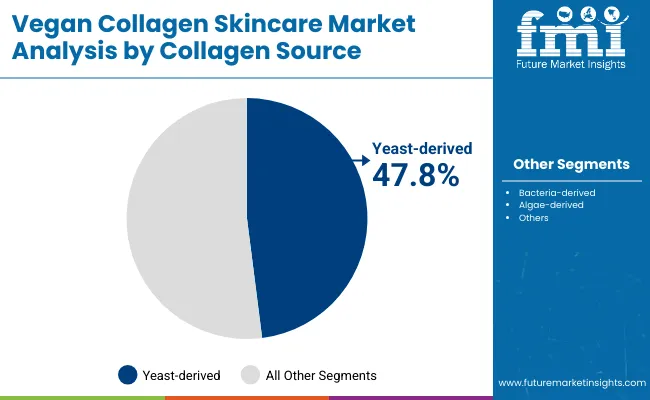
Collagen Source Segment
Market Value Share, 2025
Yeast-derived
47.8%
Others
52.2%
The yeast-derived segment is projected to contribute 47.8% of the Global Vegan Collagen Skincare Market revenue in 2025, maintaining its lead as the dominant collagen source category. This is driven by the scalability of precision fermentation, which enables high-purity collagen production without animal inputs. Yeast-derived collagen continues to gain preference among formulators for its consistency, safety profile, and ability to integrate across serums, creams, and ingestible formats.
The segment’s growth is also supported by advancements in biotech processes that reduce production costs while improving yield. As sustainable and cruelty-free positioning becomes central to skincare purchasing decisions, yeast-derived collagen manufacturers are enhancing their capacity to meet rising demand. The yeast-derived segment is expected to retain its position as the backbone of the vegan collagen category.
Insights into the Application Segment with Anti-aging Serums Dominating the Demand
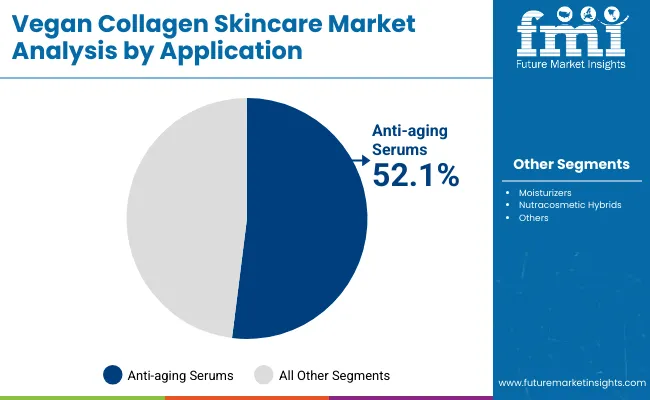
Application Segment
Market Value Share, 2025
Anti-aging serums
52.1%
Others
47.9%
The anti-aging serums segment is forecasted to hold 52.1% of the market share in 2025, led by its strong adoption across premium beauty consumers seeking clinically backed anti-wrinkle and elasticity benefits. These formulations are favored for their high concentration of active ingredients and their ability to deliver visible results, making them the entry point for vegan collagen in skincare routines.
Their lightweight texture, compatibility with multiple skin types, and positioning in the high-margin premium category have facilitated widespread adoption. The segment’s growth is further strengthened by strong online and offline retail promotion of anti-aging benefits. As consumers increasingly seek targeted, evidence-based beauty solutions, anti-aging serums are expected to continue their dominance in the market.
Insights into the Product Form Segment with Creams & Lotions Leading in Market Share

Product Form Segment
Market Value Share, 2025
Creams & lotions
54.2%
Others
45.8%
The creams & lotions segment is projected to account for 54.2% of the Global Vegan Collagen Skincare Market revenue in 2025, establishing it as the leading product form. This format is preferred for its ease of application, high consumer familiarity, and ability to integrate vegan collagen alongside other actives such as hyaluronic acid, peptides, and antioxidants.
Its suitability for hydration, anti-aging, and daily skincare routines has made it popular across mass, masstige, and premium categories. Developments in clean-label formulations and sensorial textures have further enhanced consumer acceptance. Given its balance of accessibility and premium positioning, creams & lotions are expected to maintain their leading role in the Global Vegan Collagen Skincare Market.
What are the Drivers, Restraints, and Key Trends of the Vegan Collagen Skincare Market Market?
Drivers
Biotech-led Ingredient Innovation and Brand Partnerships
The most significant driver is the rise of precision fermentation partnerships between biotech startups (e.g., Geltor, Amyris) and multinational cosmetic brands (e.g., L’Oréal, Shiseido). Unlike generic plant-based claims, these collaborations directly address consumer skepticism by validating vegan collagen’s efficacy with clinical studies and co-branded launches.
For example, Geltor’s fermentation-based “HumaColl21” was adopted in high-end serums and marketed as a scientifically superior alternative to animal collagen. Such partnerships accelerate adoption by transferring biotech credibility into established retail pipelines, enabling vegan collagen to penetrate both prestige and masstige beauty categories. This driver is unique because it moves the market beyond “vegan-friendly branding” into science-backed efficacy, ensuring long-term scalability and differentiation.
Nutricosmetic Hybridization and Cross-Category Growth
A second driver is the convergence of topical and ingestible formats, where capsules, gummies, and powders featuring vegan collagen are marketed alongside skincare products. This hybridization allows brands to position vegan collagen as a “360° beauty solution”-enhancing skin elasticity from within and without.
The integration of ingestibles into beauty specialty retailers and direct-to-consumer subscription models has been particularly strong in Asia-Pacific (China, Japan, India), where holistic beauty traditions resonate with this approach. By blurring the line between skincare and wellness, brands create higher consumer stickiness and recurring revenue models, making nutricosmetic hybrids a major growth driver not seen in conventional collagen markets.
Restraints
High Production Costs and Pricing Barrier in Mass Market
While biotech innovation drives growth, the cost of producing fermentation- or algae-derived collagen remains significantly higher than conventional animal-based collagen. This results in vegan collagen skincare products being priced at a 30-50% premium, restricting their penetration in mass-market retail segments and limiting adoption among cost-sensitive consumers in emerging markets.
Even though demand is strong in North America and Europe, price elasticity in markets like India and Latin America creates a structural barrier, slowing volume expansion. Until large-scale fermentation capacity and supply chain efficiencies reduce costs, vegan collagen will remain concentrated in premium and upper-masstige price tiers.
Consumer Skepticism about Efficacy vs. Traditional Collagen
A major restraint is lingering consumer doubt about whether vegan collagen matches the efficacy of animal-derived collagen in skin rejuvenation and anti-aging. Unlike hydrolyzed bovine or marine collagen, which has decades of clinical data, vegan collagen is relatively new, and its long-term results are still under scrutiny. This skepticism is particularly evident in markets like the USA and Germany, where educated consumers demand hard proof. Without broad clinical validation and transparent marketing, adoption could remain restricted to niche, ethically motivated segments instead of breaking into the mainstream beauty consumer base.
Key Trends
Regional Shift Toward Asia-Pacific as the Growth Engine
One of the most pronounced trends is the shift in market momentum toward Asia-Pacific, especially China, India, and Japan, which together are projected to contribute more than 45% of incremental global revenue growth by 2035. In these countries, consumers associate collagen with skin brightness, elasticity, and holistic wellness.
Unlike the West, where vegan collagen is positioned around ethics and sustainability, in Asia it is marketed as a functional, innovative ingredient for beauty and health convergence. This regional nuance will reshape global strategies, with MNCs allocating more R&D and marketing spend toward Asia-Pacific launches.
Rise of AI-Driven Personalized Vegan Collagen Solutions
A second trend is the emergence of AI-personalized skincare platforms that recommend vegan collagen products based on skin type, microbiome profile, and lifestyle inputs. Startups and established brands are using AI not only for product personalization but also to predict consumer demand trends and optimize D2C subscription models.
For instance, personalized regimens combining topical vegan collagen serums with ingestible capsules are being promoted as tailored anti-aging solutions. This trend is unique to the vegan collagen market because it directly addresses efficacy concerns, positioning biotech collagen as part of next-gen personalized beauty ecosystems rather than a generic ingredient.
Analysis of Vegan Collagen Skincare Market Market By Key Countries
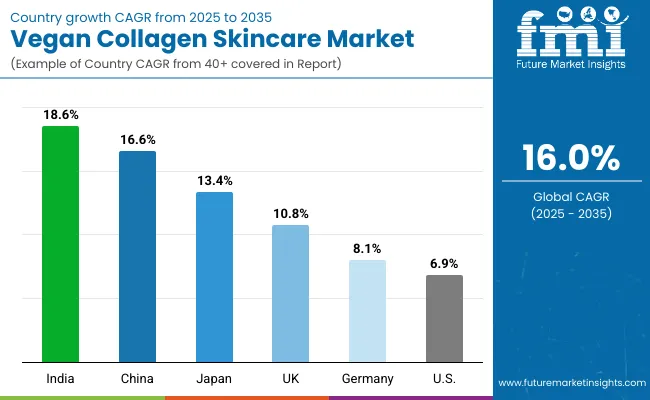
Country
Estimated CAGR (2025 to 2035)
China
16.6%
USA
6.9%
India
18.6%
UK
10.8%
Germany
8.1%
Japan
13.4%
The country-level growth outlook shows that India (18.6% CAGR), China (16.6% CAGR), and Japan (13.4% CAGR) are emerging as the primary growth engines of the global vegan collagen skincare market. India leads with the fastest projected growth, supported by a rising middle-class population, increasing awareness of plant-based beauty, and strong consumer openness to nutricosmetic hybrids.
China follows closely, driven by premium beauty adoption, government support for biotech innovation, and the growing popularity of cruelty-free brands among Gen Z consumers. Japan, with its established reputation for advanced beauty formulations and consumer preference for functional ingredients, is also expected to witness robust adoption, particularly in anti-aging serums and holistic beauty regimens. Together, these three Asia-Pacific markets will contribute significantly to the market’s incremental revenue, making the region the strategic focus for global players.
By contrast, growth in Western markets such as the USA (6.9% CAGR), Germany (8.1% CAGR), and the UK (10.8% CAGR) will remain steady but slower compared to Asia. The USA market is already mature, with vegan beauty positioned in the premium skincare segment and supported by strong e-commerce penetration. However, pricing barriers and consumer skepticism about efficacy limit its pace of expansion.
Germany and the UK, as Europe’s leading markets, show moderate growth potential, underpinned by sustainability-driven consumer choices and regulatory support for clean-label formulations. While growth is slower, these markets remain critical for revenue stability and brand positioning, particularly in premium retail channels. The divergence highlights a two-speed global market-with Asia-Pacific markets driving rapid volume growth, while North America and Europe secure steady, high-value contributions.
Sales Outlook for Vegan Collagen Skincare in the United States
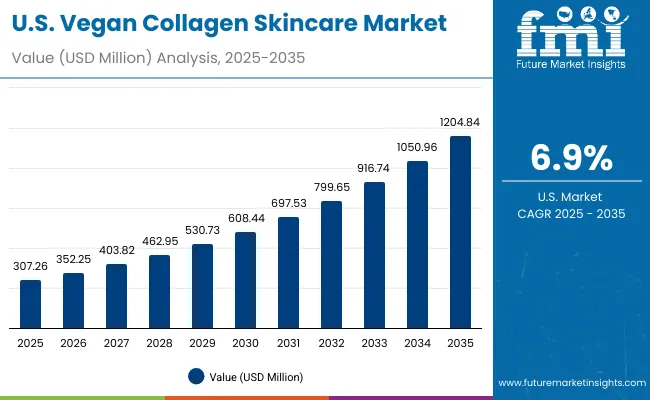
Year
USA Vegan Collagen Skincare Market (USD Million)
2025
307.3
2026
352.3
2027
403.8
2028
463.0
2029
530.7
2030
608.4
2031
697.5
2032
799.7
2033
916.7
2034
1051.0
2035
1204.8
The Vegan Collagen Skincare Market in the United States is projected to grow at a CAGR of 6.9%, supported by strong demand for premium skincare formats. Anti-aging serums remain the leading application, particularly in prestige retail and e-commerce channels, where vegan collagen is positioned as a clean and cruelty-free alternative to animal-based formulations. Growth is further supported by subscription-based D2C models that combine topical serums with ingestible collagen gummies. While pricing barriers persist, USA consumers are increasingly drawn to biotech-backed brands that highlight clinical validation and sustainable sourcing.
Anti-aging serums drive the largest share, especially in premium and masstige skincare.
D2C subscription models pairing serums and gummies are gaining traction.
Clinical validation and biotech branding are critical to consumer adoption.
Growth and Expansion Outlook for Vegan Collagen Skincare in the United Kingdom
The Vegan Collagen Skincare Market in the United Kingdom is expected to grow at a CAGR of 10.8%, fueled by a strong ethical beauty culture and rising demand for sustainable skincare. Local and multinational brands are promoting vegan collagen as part of clean beauty portfolios, with creams and lotions leading the adoption. The UK also shows early traction in nutricosmetic hybrids, particularly gummies marketed via pharmacies and health & wellness chains. Institutional support for sustainable cosmetics innovation, along with strong influencer-driven digital campaigns, continues to boost market penetration.
Clean beauty positioning underpins strong demand for vegan collagen creams & lotions.
Gummies and nutricosmetics are gaining visibility in health & wellness retail.
Digital-first campaigns and influencer marketing accelerate adoption.
Growth and Expansion Outlook for Vegan Collagen Skincare in India
India is witnessing the fastest growth in the Global Vegan Collagen Skincare Market, projected at a CAGR of 18.6% through 2035. Growth is being driven by a rising middle-class population, expanding beauty e-commerce platforms, and increasing adoption of Ayurveda-inspired formulations blended with biotech-derived collagen. Tier-2 and tier-3 cities are seeing strong uptake of affordable creams and moisturizers, while urban metros show higher demand for premium anti-aging serums and ingestible formats. Educational initiatives and local biotech startups are also pushing consumer awareness about cruelty-free, plant-based collagen alternatives, creating a foundation for rapid expansion.
Affordable vegan collagen moisturizers are driving growth in smaller cities.
Premium serums and ingestibles dominate demand in urban metros.
Ayurveda-inspired biotech formulations resonate strongly with local consumers.
Sales Outlook for Vegan Collagen Skincare in China
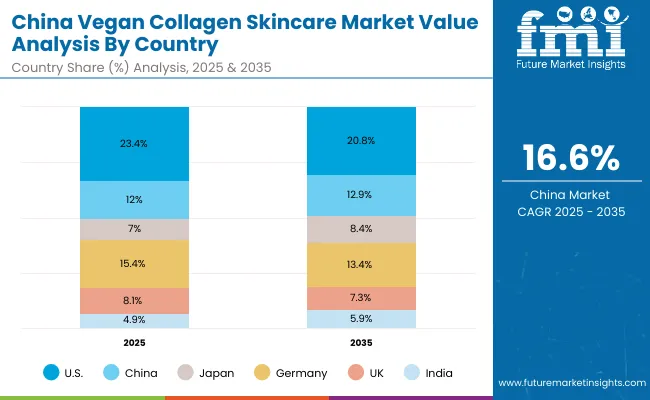
The Vegan Collagen Skincare Market in China is expected to grow at a CAGR of 16.6%, one of the highest among major economies. Growth is driven by strong consumer adoption of nutricosmetic hybrids, where capsules and powders are marketed alongside topical creams. Local brands are investing in biotech partnerships to reduce reliance on imports, while premium brands are positioned around anti-aging efficacy for urban consumers. Municipal and provincial regulations supporting cruelty-free products further accelerate adoption. With competitive innovation from domestic firms and strong e-commerce penetration, vegan collagen is rapidly transitioning into a mainstream skincare category in China.
Nutricosmetic hybrids (capsules & powders) are key growth drivers.
Local biotech partnerships are strengthening domestic supply chains.
Cruelty-free regulatory backing and e-commerce penetration boost adoption.
Country
2025 Share (%)
USA
23.4%
China
12.0%
Japan
7.0%
Germany
15.4%
UK
8.1%
India
4.9%
Country
2035 Share (%)
USA
20.8%
China
12.9%
Japan
8.4%
Germany
13.4%
UK
7.3%
India
5.9%
Opportunity Analysis of USA Vegan Collagen Skincare Market
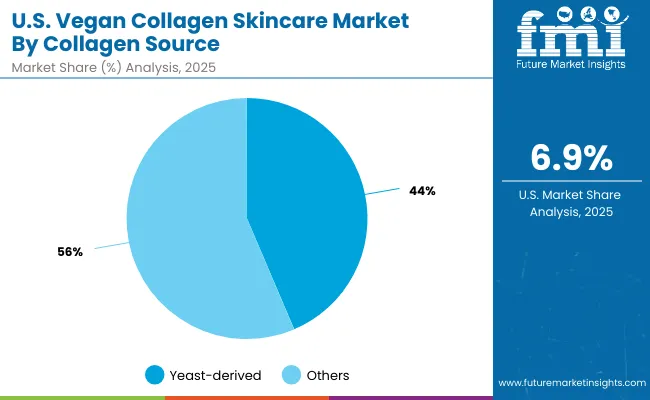
Collagen Source Segment
Market Value Share, 2025
Yeast-derived
43.6%
Others
56.4%
The Vegan Collagen Skincare Market in the USA is valued at USD 307.3 million in 2025, with yeast-derived collagen accounting for 43.6% of revenue. The dominance of yeast-based formulations stems from USA consumers’ preference for clinically validated biotech ingredients and the established production scalability of yeast fermentation. Premium beauty brands are adopting yeast-derived collagen for serums and creams targeted at anti-aging and skin elasticity, with strong traction in masstige and luxury categories.
This advantage positions yeast-derived collagen as the foundation of USA vegan collagen innovation, particularly in serums and ingestible hybrids marketed through subscription-based e-commerce platforms. While algae and bacteria-derived alternatives are entering niche segments, yeast remains indispensable due to its consistency, cost efficiency, and proven safety. Future growth will be enhanced by AI-personalized beauty solutions and bundled topical + ingestible regimens, creating long-term revenue opportunities.
Market size for USA in 2025 is USD 307.3 million
Global market share is approximately 23.4% in 2025
Yeast-derived collagen leads with 43.6% share, driven by biotech credibility and scalability
Opportunity Analysis of China Vegan Collagen Skincare Market
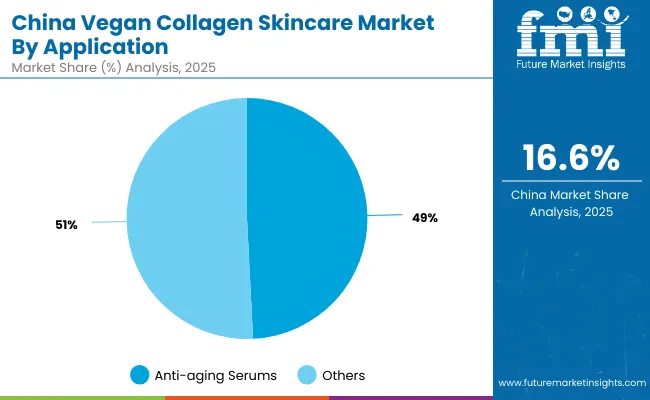
Application Segment
Market Value Share, 2025
Anti-aging serums
49.2%
Others
50.8%
The Vegan Collagen Skincare Market in China is valued at USD 157.0 million in 2025, with anti-aging serums contributing 49.2% of sales. This dominance is directly tied to China’s premium beauty culture, where anti-aging and whitening products are the fastest-growing categories. Consumers in urban centers such as Shanghai and Beijing are particularly receptive to vegan collagen serums marketed with efficacy-focused claims like wrinkle reduction and elasticity improvement.
This positioning makes anti-aging serums the entry point for vegan collagen adoption in China, supported by cross-category launches in nutricosmetic hybrids (capsules, powders) marketed through Tmall, JD.com, and direct-to-consumer apps. While moisturizers and hybrid formats hold nearly equal share, serums remain critical for capturing the high-margin segment. The expansion of cruelty-free regulations and government encouragement of biotech innovation will further amplify opportunities in China.
Market size for China in 2025 is USD 157.0 million
Global market share is approximately 12.0% in 2025
Anti-aging serums lead with 49.2% share, driven by urban consumer demand for efficacy
Competitive Landscape of Global Vegan Collagen Skincare Market
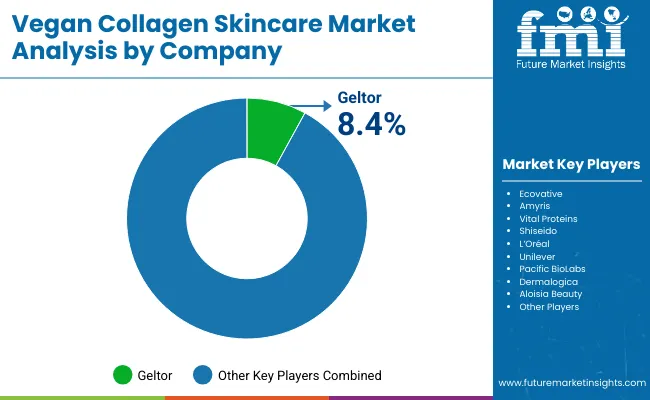
Company
Global Value Share 2025
Geltor
8.4%
Others
91.6%
The Global Vegan Collagen Skincare Market is moderately fragmented, with biotech innovators, multinational beauty giants, and niche clean beauty brands competing across topical and ingestible applications. Global biotech leaders such as Geltor and Amyris hold measurable market share, driven by fermentation-based collagen with clinically backed performance. Their strategies emphasize biotech IP, clinical partnerships, and ingredient licensing to large beauty companies.
Multinational brands like L’Oréal, Shiseido, and Unilever dominate retail penetration, leveraging distribution scale and brand trust to integrate vegan collagen into creams, serums, and masstige product lines. Meanwhile, niche brands such as Dermalogica, Pacific BioLabs, and Aloisia Beauty differentiate through clean-label formulations, digital-first engagement, and strong positioning in the wellness-beauty crossover. Competitive differentiation is shifting away from legacy beauty branding toward biotech partnerships, ecosystem integration, and sustainable sourcing strategies that resonate with ethically minded consumers.
Key Developments in Vegan Collagen Skincare Market Market
In 2024, L’Oréal launched a new line of vegan collagen-based anti-aging serums and creams under its prestige brands targeting the Chinese and Japanese markets. The products leveraged biotech-collagen sourced from fermentation processes and were positioned around sustainability and high efficacy.
In 2023, Geltor expanded its biodesigned collagen portfolio by scaling HumaColl21, the first human-identical vegan collagen produced through precision fermentation, into broader commercial availability. By 2024, the company secured partnerships with multiple global skincare brands to incorporate this ingredient into anti-aging serums and creams, especially in North America and Asia
Scope of the Report
Item
Value
Quantitative Units
USD 1,311.8 million
Collagen Source
Yeast-derived, Bacteria-derived, Algae-derived
Application
Anti-aging serums, Moisturizers, Nutricosmetic hybrids
Product Form
Creams & lotions, Powders, Capsules/gummies
Distribution Channel
E-commerce, Pharmacies/drugstores, Beauty specialty retailers
Regions Covered
North America, Europe, Asia-Pacific, Latin America, Middle East & Africa
Country Covered
United States, Canada, Germany, France, United Kingdom, China, Japan, India, Brazil, South Africa
Key Companies Profiled
Geltor , Ecovative , Amyris , Vital Proteins, Shiseido, L’Oréal, Unilever, Pacific BioLabs , Dermalogica , Aloisia Beauty
Additional Attributes
Dollar sales by collagen source, application, product form, and distribution channel; adoption trends in anti-aging serums and nutricosmetic hybrids; rising demand for ingestible collagen formats such as gummies and powders; sector-specific growth across premium beauty and wellness categories; e-commerce and D2C subscription channel expansion; integration with AI-personalized skincare platforms; regional trends influenced by ethical beauty movements and cruelty-free regulations; innovations in fermentation, algae biotechnology, and cross-category hybrids.

